Why small-time criminals burned a London warehouse for Russia's mercenary group Wagner
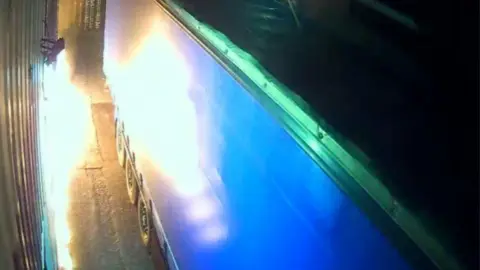 Metropolitan Police
Metropolitan PoliceJust before midnight on 20 March last year, two small-time criminals from south London set alight a warehouse containing vital communications equipment destined for Ukraine.
They did not do it for ideological reasons. Instead, they did it for cash. The pair were arsonists for hire - referred to as "road men" in court - working indirectly for the Wagner Group, the mercenary group now controlled by the Russian state.
The fire-setters' connection to Wagner was through a small-time drug dealer from Leicestershire, called Dylan Earl.
Five men, including Earl, have now been convicted over their involvement in the arson attack, which caused £1m of damage.
Earl had been in touch with pro-Russian accounts earlier in the month on the secure messaging app Telegram.
With one account, which had the username Minsk KGB, he discussed whether he should go and fight for Russia in Ukraine, saying: "I need a fresh start bro. Do I need to speak Russian though? Because that's not the best. Litch [literally] know 30 words if that."
But by 16 March - four days before the attack - he was being tasked by a Telegram account linked to the Wagner Group to do some work in the UK.
It used the name Privet Bot - meaning "hello bot" in Russian - a notorious Telegram account that has encouraged sabotage attacks and murder in other parts of Europe.
The account wrote to Earl: "We have our first task for you. The map shows there are a few buildings at this address. And there are warehouses among them.
"They sponsor and provide aid to Ukrainian terrorists. Today we await from you photos and videos of the warehouse and the building and of the people owners of the warehouse."
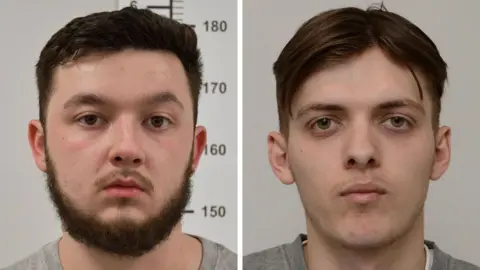 Metropolitan Police
Metropolitan PoliceSome of the messages the group exchanged were shortened or written in non-conventional ways, something that is commonly used to prevent social media filters tracking the content.
Earl contacted another man, Jake Reeves, who was a cleaner at Gatwick Airport, through a Telegram group set up to put criminals in touch with each other.
At Earl's request, Reeves, from Croydon, in south London, got hold of a local acquaintance of his, Nii Mensah, who was clearly ready to carry out crimes for cash.
Mensah had never met Earl, but he soon messaged him, saying: "I'm down for da causee bro. 3 ppl and car."
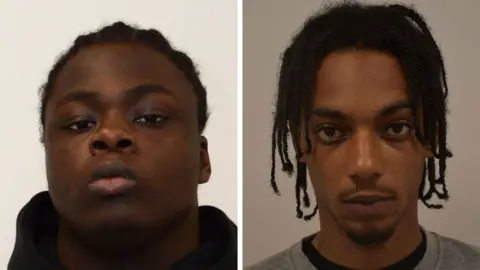 Metropolitan Police
Metropolitan PoliceOn the night of 20 March, four men set out from south London in a red Kia Piccanto.
Sixty-one-year-old Paul English was at the wheel. In court, he denied knowing what was going to happen on the night and was found not guilty of arson.
Nineteen-year-old Ugnius Asmena sat beside him in the passenger seat, while Mensah and his friend Jakeem Rose, both 21 years old at the time, sat in the back.
The four men drove north across the Thames and into Leyton, in east London, where they headed to the Cromwell Industrial Estate. They parked at the back of the warehouses.
Mensah and Rose got out, collected a jerry can from the boot, climbed over a wall and headed for units one and two. The warehouses the Wagner Group wanted to be burned were used by two businesses involved in sending parcels and equipment to Ukraine.
Both are owned and part-owned by Mikhail Boikov, a British-Ukrainian businessman.
It was not a sophisticated attack.
With Mensah streaming the whole event to Earl on FaceTime, Rose poured petrol along the front of the warehouses, lit a rag, and set the buildings alight.
The four men fled in the Piccanto. But not before Rose accidentally left a large zombie-style knife behind at the scene with his DNA on it.
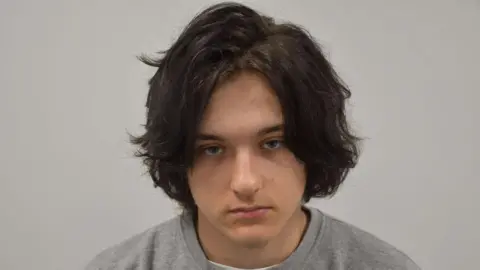 Metropolitan Police
Metropolitan PoliceIn a lorry parked next to the warehouse, Yevhen Harasym was trying to sleep.
"I heard the crackling noise of the metal rolls of the warehouse door and realised that something was happening. I opened the door and saw the fire," he said while giving evidence in court.
"I grabbed the fire extinguisher from the back of the lorry.
"I was able to extinguish the fire outside the door, but the flames inside the warehouse continued to burn."
Eventually he had to retreat and move his lorry to safety, leaving the blaze to the fire brigade.
By the time the fire was out more than £100,000 worth of goods had been destroyed including communications equipment for Starlink satellites, which have proved vital on the frontline in the war in Ukraine.
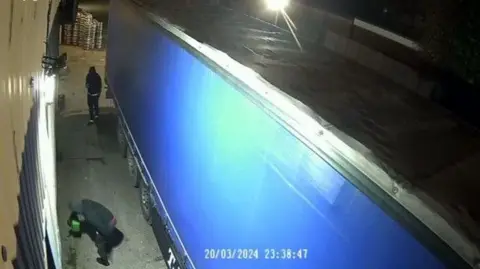 Metropolitan Police
Metropolitan Police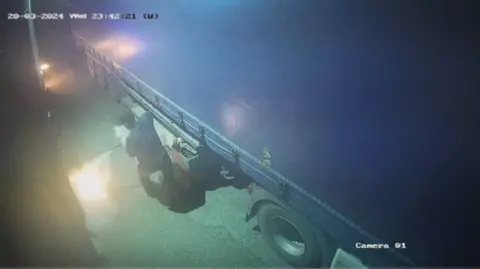 Metropolitan Police
Metropolitan PoliceEarl was delighted, messaging an online contact: "Got that warehouse ting done. It was the one behind all the gates. Bro 8ft gates around whole ting."
But his Wagner Group handler Privet Bot was less pleased, saying on Telegram: "You rushed into burning these warehouses without my approval. Now it will be impossible to pay for this arson.
"We could have burned the warehouses much better and more if we had coordinated our actions. It was necessary to set fire in different places all around the perimeter at once and it would be bigger."
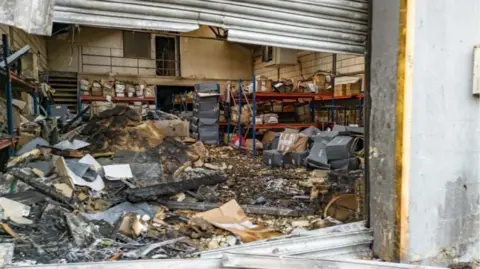 Metropolitan Police
Metropolitan PoliceWhile encouraging Earl to be more patient, Privet Bot told him to watch the TV spy series The Americans, which tells the story of KGB agents operating patiently deep undercover in the US in the 1980s.
But further down the chain everyone Earl had hired was furious at not getting paid. Eventually, eager for more cash, they patched things up. Within two days Privet Bot had another job for Earl, and his men for hire.
"Two places burning in the west," Earl wrote to a contact who used the handle 'Kash Money'. Recon also. Wine shop. Restaurant."
"How much tho?" Kash Money asked.
"£5,000. Maybe 6", Earl replied. "If they nap [kidnap] the guy 15."
In a parallel discussion, he wrote to Reeves: "Correspondence London: £1,000.00 East Warehouse. £5,000.00 West Wine Shop. £5,000.00 West restaurant. Total - £11,000.00."
In his Telegram chat with Earl, Reeves was still wondering why Wagner had wanted the warehouse burned down. Earl wrote: "It's a mail provider to Russia, Ukraine and Belarus from UK. Ran by a Ukrainian man who send 100+ lorries to Ukraine."
Russian 'billionaire'
The wine shop and restaurant plot targeted exiled Russian businessman Evgeny Chichvarkin.
He had made hundreds of millions of pounds by creating Russia's largest mobile phone retailer, Evroset. But he had fallen out with the hard men in the Russian government and was forced to sell his business in 2008.
He now runs an award-winning wine shop in London's Mayfair, called Hedonism Wines, as well as a Michelin-starred restaurant, called Hide.
Since Russia's invasion of Ukraine he had personally driven several lorries of medical aid to Ukraine. Reeves wrote on Telegram that the Wagner contact wanted Mr Chichvarkin kidnapped "to get him sent back to Russia for imprisonment".
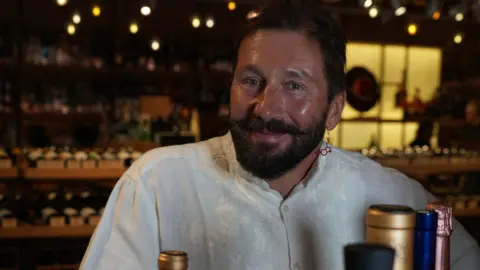
Earl persuaded a man - who was not charged with any offence - to conduct some reconnaissance of the wine shop.
The shop and restaurant were never actually attacked, as counter terrorism police disrupted the plot, nor was Mr Chichvarkin kidnapped.
Speaking to the BBC, Mr Chichvarkin said even after the failed plot he has tried not to think about the threat he faces.
Partisan cells
The Wagner Group's strategy seems to have been to sow wider chaos in the UK, as well as targeting people who were helping Ukraine.
At one point Privet Bot asked Earl: "Do you have any friends among hooligans or acquaintances in the IRA?
"We need people that you have across Europe and the UK. We need those who are our kindred spirit.
"You need to organise partisan cells in the country and in Europe. And think of a name for your movement. We'll give you support."
As the plan developed, Earl started to drag other people into the proposed kidnap and attack on the Mayfair wine shop, including his drug-dealing contacts. Ashton "Ace" Evans was a small-time dealer operating out of Pontywaun near Newport, in South Wales, and was one of the people Earl approached.
"It has to be clean bro. Full masks, not ballies [balaclavas]. I can provide if needed. Gloves. No number plates," Earl wrote. "It's 10-15 minutes from Buckingham Palace."
"Yhhhh that's gonna bring a lot of attention", Evans wrote back. "MI5 etc."
"This owner is a billionaire from Russia," Earl explained.
"Does it need to be explo** [explosives] can it be just a fire?" Evans asked.
Earl replied: "Fire is possible, But if it doesn't fully burn they will not pay me more than 25%."
Evans was found guilty of failing to tell the police about the Mayfair plot.
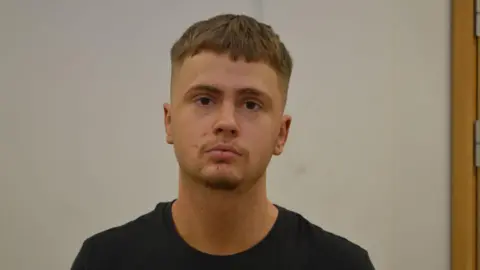 Metropolitan Police
Metropolitan PoliceBy 9 April, relations between Earl and his Wagner Group contact had shown signs of cooling. Earl was worried and sent Privet Bot a stream of messages.
"I know I can be the best spy you have ever seen but we need more communication and faster work with contracts," he wrote.
"I am a very good leader, coordinator and organiser," he boasted. "I am offering you… spy operations in my country against individuals, business, government, even in Europe."
Eventually Privet Bot wrote back urging him to be patient.
"You remind me of myself at your age and there are things you should learn. You are our dagger in Europe and we will be sharpening you carefully so that you will become sharper."
On 10 April, Earl was arrested by counter-terrorism detectives in the car park of a branch of B&Q, in Hinckley.
Verdicts
Earl pleaded guilty to preparing acts of serious violence on behalf of a foreign power (Russia), an offence under the new National Security Act. He also pleaded guilty to aggravated arson, possessing cocaine with intent to supply, and possessing £20,070 that was the proceeds of crime.
Reeves pleaded guilty to agreeing to accept money from a foreign intelligence service - the Wagner Group - also under the new National Security Act. He also pleaded guilty to aggravated arson.
During the trial, at London's Old Bailey, Mrs Justice Cheema-Grubb said generations before them would have described what the pair had done simply as "treason".
Nii Mensah, Jakeem Rose, Ugnius Asmena were found guilty of aggravated arson. Rose had previously pleaded guilty to possession of a knife.
The driver Paul English, 61, was cleared of all wrongdoing.
Ashton Evans, 20, was found guilty of failing to disclose information about terrorist acts relating to the Mayfair plot, but cleared of failing to tell authorities about the warehouse arson.
Another man, Dmirjus Paulauskas, 23, was cleared of two similar offences relating to both terrorist plots after the jury deliberated for nearly 22 hours.
Commander Dominic Murphy, head of the Metropolitan Police's Counter Terrorism Command, said the response to state threats, particularly from Russia, had changed following the Salisbury nerve agent attack, in 2018.
"We've made the UK a hostile operating environment," he said. "As a result, they've diversified and are now contacting relatively young people to act on their behalf as proxies in doing their activity."
